
MARINE ORNITHOLOGY
Scope & Guideline
Connecting Research and Conservation in Marine Ornithology
Introduction
Aims and Scopes
- Conservation and Management of Marine Birds:
The journal emphasizes research on the conservation status of marine birds and management practices to mitigate threats they face, including habitat loss, climate change, and human interactions. - Ecological and Behavioral Studies:
Research published in the journal includes ecological studies that investigate the behavior, life history, and population dynamics of marine birds, contributing to a better understanding of their ecology. - Impact of Climate Change and Environmental Factors:
The journal focuses on how climate change and environmental alterations affect marine bird populations, their breeding success, and distribution patterns. - Monitoring and Survey Techniques:
Marine Ornithology promotes the development and application of innovative monitoring techniques, including the use of technology such as drones and acoustic monitoring, to study seabird populations. - Interdisciplinary Approaches:
The journal encourages interdisciplinary research that combines ornithology with other fields such as marine biology, ecology, and conservation science to address complex issues affecting marine birds.
Trending and Emerging
- Climate Change Impacts:
There is an increasing focus on how climate change affects marine bird populations, breeding success, and migratory patterns, emphasizing the urgency of understanding these impacts for conservation. - Innovative Monitoring Techniques:
The adoption of new technologies, such as drones and remote video monitoring, is trending in seabird research, allowing for more efficient data collection and enhanced understanding of seabird behavior and ecology. - Conservation Success Stories:
Emerging research highlights successful conservation initiatives, such as predator eradication and habitat restoration, showcasing positive outcomes for seabird populations and providing models for future efforts. - Human-Seabird Interactions:
Research examining the interactions between marine birds and human activities, such as fishing and shipping, is gaining prominence, reflecting a growing recognition of the need to balance human interests with conservation. - Health and Disease Studies:
There is a notable increase in research focused on the health of marine birds, including the impacts of diseases and environmental contaminants, which are crucial for understanding population dynamics and conservation strategies.
Declining or Waning
- Traditional Taxonomy and Systematics:
Research exclusively focused on taxonomic classifications and systematics of marine birds has decreased. This decline may reflect a shift towards more applied research that addresses conservation and ecological impacts. - Historical Population Studies:
There has been a waning interest in studies that solely focus on historical population trends without linking them to current conservation efforts or ecological relevance. - Generalized Habitat Studies:
Papers that explore marine bird habitats without specific conservation implications or detailed ecological insights are becoming less common, indicating a trend towards more targeted research. - Non-quantitative Observational Studies:
The journal has seen a decrease in non-quantitative observational studies that lack robust methodologies, as there is a growing emphasis on data-driven research that provides actionable insights.
Similar Journals

Ornithology Research
Advancing Knowledge in Ornithology and ConservationOrnithology Research is a leading academic journal published by SPRINGERNATURE, specializing in the field of avian studies and contributing to the broader category of Animal Science and Zoology. With a respectable Q2 ranking in its field as of 2023, this journal provides a dynamic platform for the dissemination of innovative research findings related to ornithology, ecology, and conservation. The journal, which transitioned to an Open Access model, ensures that its research is accessible to a global audience, fostering collaboration and knowledge sharing across disciplines. With an E-ISSN of 2662-673X, Ornithology Research serves the needs of researchers, professionals, and students dedicated to understanding the complexities of avian life. Its commitment to high-impact, peer-reviewed articles makes it an essential resource for anyone interested in advancing the science of ornithology.

NOTORNIS
Exploring the intricacies of birdlife and ecology.NOTORNIS is a prestigious academic journal published by the Ornithological Society of New Zealand, dedicated to advancing the field of ornithology and contributing meaningful research related to avian species. With ISSN 0029-4470 and E-ISSN 1177-7680, this journal has been a vital resource for scholars since its inception in 1982, continuously fostering discourse within the scientific community, particularly in the realms of animal science and zoology. Though it currently holds a quartile ranking of Q4, with a Scopus rank of #250 out of 490 in its category, NOTORNIS occupies a unique niche in ornithological research, promoting studies that highlight the ecological and biological intricacies of birds. This journal is critical not only to researchers and professionals in zoology but also to students and educators aiming to engage with contemporary avian research. As New Zealand's leading ornithological publication, NOTORNIS underscores the importance of avifaunal studies in conserving biodiversity and understanding ecological dynamics.
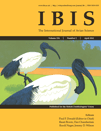
IBIS
Advancing ecological knowledge since 1859.IBIS, published by WILEY, stands as a prestigious journal in the field of animal science, zoology, and ecology since its inception in 1859. With a focus on innovative research that informs the scientific community on ecological dynamics, behavioral studies, and conservation strategies, IBIS fills a critical niche for researchers, professionals, and students alike. The journal is recognized for its robust impact factor and commands a Q1 ranking in three key categories as of 2023, demonstrating its influence and reach within the global academic landscape, particularly in Animal Science, Ecology, Evolution, Behavior and Systematics, and Nature and Landscape Conservation. Although not an open-access publication, its rigorous peer-review process ensures high-quality contributions that advance knowledge in these vital areas. Through interdisciplinary collaboration and comprehensive coverage of cutting-edge topics, IBIS remains an essential resource for those striving to understand and protect our natural world.
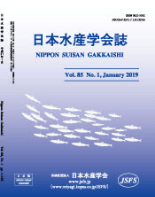
NIPPON SUISAN GAKKAISHI
Cultivating a Legacy of Aquatic Research ExcellenceNIPPON SUISAN GAKKAISHI, published by the Japanese Society of Fisheries Science, is a prestigious journal with a long history dating back to its inaugural issue in 1932. This journal, which spans key contributions to the field of Aquatic Science, serves as a vital platform for the dissemination of important research findings related to fisheries and aquatic biology, fostering knowledge and innovation in Japan and beyond. Although it is not an open-access publication, its rigorous peer-review process ensures the quality and integrity of the articles published. The journal is currently listed in the Q4 category for Aquatic Science according to the 2023 metrics, placing it within a niche but significant corner of the research landscape. With an ISSN of 0021-5392 and E-ISSN of 1349-998X, it continues to provide essential insights that benefit researchers, professionals, and students alike, highlighting advancements and challenges within aquatic ecosystems over a converged year span that continues to evolve through to 2024.
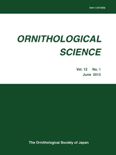
ORNITHOLOGICAL SCIENCE
Exploring the wonders of bird science and conservation.ORNITHOLOGICAL SCIENCE, published by the Ornithological Society of Japan in collaboration with the University of Tokyo, stands as a pivotal platform for advancing knowledge in the field of ornithology. With a keen focus on avian biology and conservation, this esteemed journal is dedicated to publishing high-quality research, reviews, and technical notes that explore the intricacies of bird science. Although currently categorized within the Q4 quartile in Animal Science and Zoology, the journal aims to elevate its standings by fostering scholarly communication and impactful scientific discourse. This journal has been consistently publishing since its inception in 2002, with a brief hiatus before resuming its invaluable contributions to the scientific community in 2009. Despite the absence of specific open access options, the journal remains a crucial resource for researchers, professionals, and students seeking to expand their understanding of avian ecology and behavior. Through its comprehensive scope, ORNITHOLOGICAL SCIENCE reflects the increasing importance of ornithological studies in addressing global biodiversity issues and conservation challenges.

CYBIUM
Advancing knowledge in ichthyology and aquatic sciences.CYBIUM is a reputable journal published by the Société Française d'Ichtyologie, dedicated to advancing research within the fields of Animal Science and Zoology as well as Ecology, Evolution, Behavior and Systematics. With a commitment to fostering scientific dialogue, CYBIUM has been a valuable resource for scholars since its inception in 1996, reporting on a wide array of ichthyological studies and aquatic biology. The journal is recognized in the 2023 Scopus rankings with a notable position in the Q3 quartile for Animal Science and Zoology and Q4 for Ecology, Evolution, Behavior and Systematics, reflecting its growing influence in these disciplines. Although currently not categorized as Open Access, CYBIUM continues to provide essential insights into fish biology and ecology from the heart of France, the Museum national d'Histoire naturelle in Paris. Researchers, professionals, and students in related fields will find CYBIUM an indispensable tool for staying informed about the latest developments and research trends within ichthyology and marine sciences.

Ocean Science Journal
Charting New Waters in Ocean ScienceOcean Science Journal, published by the Korea Institute of Ocean Science and Technology (KIOST), is a pivotal resource for scholars and practitioners in the field of oceanography. With the ISSN 1738-5261 and E-ISSN 2005-7172, this journal presents cutting-edge research from 2006 to 2024, bridging fundamental and applied ocean sciences. Based in South Korea, with its headquarters located in Busan, the journal has achieved a commendable Scopus rank of #72 out of 145 in the domain of Earth and Planetary Sciences, placing it in the 50th percentile among peer publications. Classified in the Q3 category of the 2023 Oceanography rankings, Ocean Science Journal offers a platform for innovative studies that advance understanding of marine environments and promote sustainable ocean practices. While it does not operate under an open access model, readers and contributors can expect high-quality, peer-reviewed material that addresses pressing oceanic challenges and developments. This journal serves as an essential tool for researchers, professionals, and students committed to fostering marine science and ocean technology.
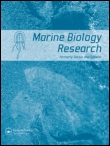
Marine Biology Research
Advancing marine science for a sustainable future.Marine Biology Research is a premier journal published by Taylor & Francis, focusing on the dynamic field of marine biology and its intersecting realms of aquatic science, ecology, and oceanography. Since its inception in 2005, this journal has served as a crucial platform for researchers and professionals to disseminate their findings, with a vision extending to 2024 and beyond. The journal is recognized with a Q3 quartile ranking in both Aquatic Science and Ecology, Evolution, Behavior and Systematics, underscoring its growing influence in these fields as evidenced by its Scopus rankings. Located in the United Kingdom, Marine Biology Research aims to foster collaboration and innovation through open access options, facilitating knowledge exchange among the academic community. With a steady commitment to advancing marine sciences, this journal is an invaluable resource for those dedicated to understanding and preserving our ocean ecosystems.
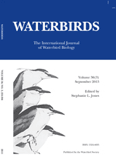
WATERBIRDS
Advancing Knowledge on Waterbirds and Their EcosystemsWATERBIRDS, published by the WATERBIRD SOC, serves as a vital scholarly resource in the field of Animal Science and Zoology. With its ISSN 1524-4695 and E-ISSN 1938-5390, this journal has established a significant presence since its inception in 1996, continuing to contribute valuable insights and research up to 2024. Recognized for its impact within the academic community, WATERBIRDS is currently positioned in the third quartile (Q3) for its category in 2023, ranking 335 out of 490 in Scopus's Agricultural and Biological Sciences sector, which underscores its role in promoting the study of avian species and their habitats. The journal is accessible to a wider audience, aligning with the growing demand for open access to scientific knowledge. By disseminating research that addresses both ecological and conservation issues pertinent to waterbirds, this publication serves as an essential platform for researchers, professionals, and students dedicated to advancing the understanding of avian biology and related fields.

MARINE AND FRESHWATER RESEARCH
Diving into the dynamics of ecosystems.Marine and Freshwater Research is a prestigious journal published by CSIRO PUBLISHING that serves as a key platform for the dissemination of cutting-edge research in the fields of Aquatic Science, Ecology, and Oceanography. With an impactful presence since its inception in 1948, the journal provides critical insights into the dynamics of freshwater and marine ecosystems, promoting interdisciplinary approaches that contribute to our understanding of biodiversity and sustainability. Currently ranked in the Q2 category across major scientific domains, including Ecology and Aquatic Science, it enjoys a robust academic reputation supported by impressive Scopus rankings, such as Rank #66/247 in Aquatic Science and Rank #44/145 in Oceanography, reflecting its high citation impact and relevance. While offering a subscription-based access model, the journal remains dedicated to fostering dialogue and innovation within the scientific community, aiming to bridge the gap between research findings and practical applications in environmental management. Located in Australia, Marine and Freshwater Research is an essential resource for researchers, professionals, and students dedicated to exploring the complexities of aquatic ecosystems and advocating for their preservation.